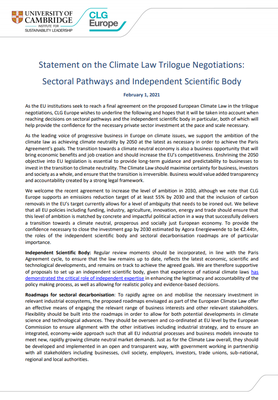
23 February 2021 – Ahead of the Climate Law trilogue in February 2021, CLG published a position statement on the importance of setting up an independent scientific body and sectoral pathways to achieve climate neutrality by 2050 and the goals of the Paris Agreement.
Read the statement in full here.
Never before has the question of what a sustainable business is and how it can be achieved been more important or urgent. Simply put, sustainability is about achieving prosperity and welfare for all of society over the longer term. The objective of such wellbeing is primarily twofold: first, optimising equitable wellbeing outcomes; and secondly, protecting and regenerating the social and natural resource base that underpins this wellbeing. Given that business serves as the engine of an economy, it is equally legitimate to consider companies as being central to the delivery of sustainability.
The statement underlines that “the Climate Law should maximise certainty for business, investors and society as a whole, and ensure that the transition is irreversible. Business would value added transparency and accountability created by a strong legal framework.”
“To provide the confidence necessary to close the investment gap by 2030 estimated by Agora Energiewende to be €2.44tn, the roles of the independent scientific body and sectoral decarbonisation roadmaps are of particular importance”:
- Need for an Independent Scientific Body: “Regular review moments should be incorporated, in line with the Paris Agreement cycle, to ensure that the law remains up to date, reflects the latest economic, scientific and technological developments, and remains on track to achieve the agreed goals. We are therefore supportive of proposals to set up an independent scientific body, which experience of national climate laws suggests is very important to ensure this.”
- Roadmaps for sectoral decarbonisation: “To rapidly agree on and mobilise the necessary investment in relevant industrial ecosystems, the proposed roadmaps envisaged as part of the European Climate Law offer an effective means of engaging the relevant range of business interests and other relevant stakeholders. Flexibility should be built into the roadmaps in order to allow for both potential developments in climate science and technological advances.”
The position statement welcomes “the recent agreement to increase the level of ambition in 2030”, although notes “that CLG Europe supports an emissions reduction target of at least 55% by 2030 and that the inclusion of carbon removals in the EU’s target currently allows for a level of ambiguity that needs to be ironed out.”





